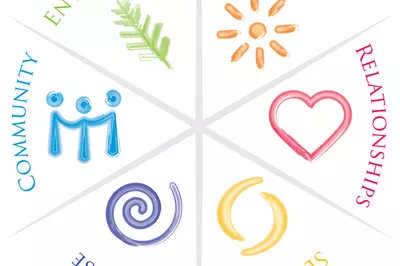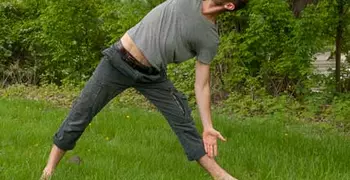Wellbeing for the New Year

Every year, as the ball drops on New Year's Eve, millions of Americans make a promise to be different—better, healthier, and happier—and yet only 1 out of 4 will actually stick to his or her resolution. One reason for this may be that our resolutions rarely address our overall wellbeing—a sustained feeling of harmony, energy, safety, and peace.
Resolutions like "lose ten pounds," "learn a new language," or "quit smoking" are perfectly reasonable goals, but they each only address a small part of our wellbeing. It's not just our weight or our diet or our education that creates health and happiness; there are numerous factors that are continuously affecting one another.
Achieving personal balance
As you consider how to be healthier and happier this year, you may begin by asking yourself a basic question: "What can I do to achieve more balance in my life?" Perhaps you are an avid exerciser, but you feel unfulfilled by your career. Or maybe you eat a well-balanced diet but feel lonely much of the time. Where in your life do you need to look to find wellbeing for yourself?
Six aspects of wellbeing
Wellbeing is a personal state that includes the following six aspects. Take some time to deeply consider each one and discover which parts of your own life may need more attention this year.
- Health includes not only our body but our mind as well—in other words, the way we handle our emotions, attitudes, and stress. Look at the areas in your life where your body and mind might need particular attention. For example, are you getting enough sleep at night? Poor sleep has been linked to obesity, lowered immune function, and memory problems. Are you getting enough exercise? Exercise is not only essential for weight management and physical health; it improves mood and sleep patterns. Taking care of your body and responding to emotions and stress in a healthy way can create a ripple effect of positive health throughout your life.
- Our relationships can affect us in larger ways that we might realize. Studies have shown that people with strong relationships live longer than those who stay isolated. But don't let that statistic frighten you if you don't have many friends—helping others out by volunteering or giving them comfort when they need it can also boost your life expectancy.
- Having a sense of security contributes to wellbeing by lowering levels of anxiety and fear, which have negative impacts on health. Ensuring the safety of yourself and others is an important part of fostering wellbeing. You can nourish your own sense of security by practicing preventative habits—like wearing a seatbelt or helmet—or actively engaging in your own healthcare by talking to your provider about questions you have.
- Knowing our purpose in life calls us to examine our gifts, passions, and values, as well as the way that we can serve the needs of the world. Our purpose is where we find meaning, and it can improve our physical health, lengthen our lives, and improve our relationships with others. For many people, finding purpose is an ongoing process throughout life, so do a check-in with yourself every once in a while. Ask: Do I feel fulfilled? Is what I do meaningful? Where do I feel a connection to something larger than myself?
- Our community may feel like it's something that exists outside of our personal domain, but the lives of those around you deeply affect your own. Consider getting more involved with your community in 2013 by volunteering or getting to know your neighbors. A strong community will in turn foster the wellbeing of individuals. What can you do to facilitate wellbeing in your neighborhood, church, or place of work?
- Likewise, the environment in which you live can affect your wellbeing. Take some time to examine your personal space—does it reflect serenity and organization, or is it cluttered and chaotic? Your own mood, as well as your physical health, will reflect the environment around you. Make sure you take time to be with nature every day this year, whether that means taking a walk outside over your lunch break or putting a leafy, green plant in your kitchen. This may help you avoid the depression scientists now realize is caused by "nature deprivation."
Wellbeing is a dynamic process; each of these aspects influences the others. Notice that when you flourish in one area, you tend to do well in the others. And don't be hard on yourself if you slip up in one area. Achieving wellbeing requires patience, self-compassion, and the willingness to try again.
Take small steps along the way and trust that by nourishing yourself and those around you, a balance will emerge that's just right for you.




